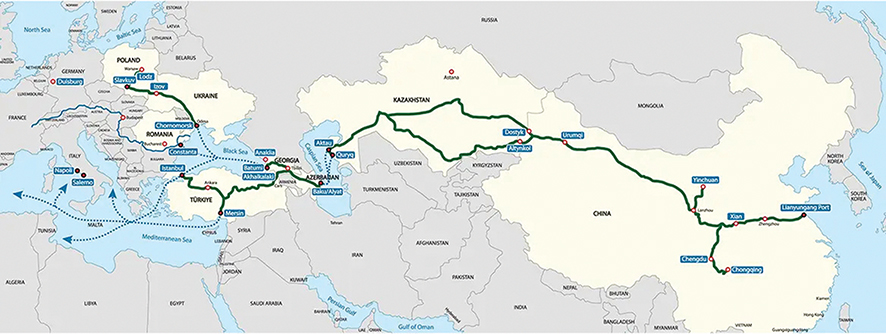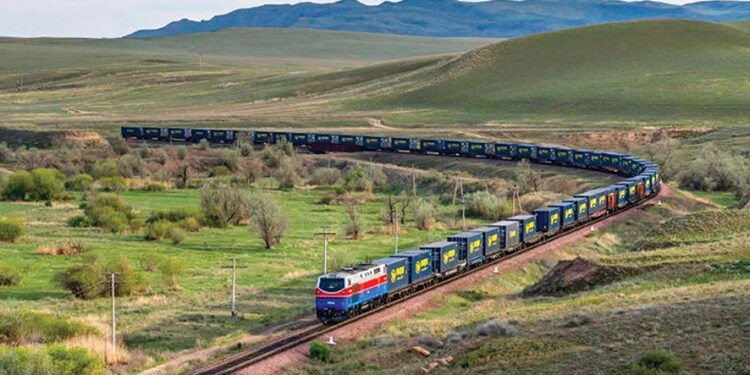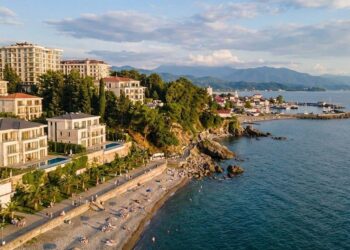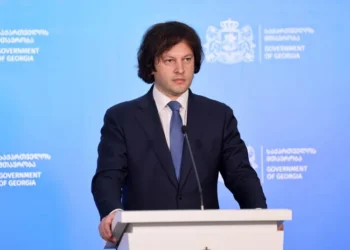By Sally White for Investor.ge
Business on the Middle Corridor, the 3,000 kilometer, multi-modal route that traverses Europe then the Black Sea, the southern Caucasus and Central Asia to China and beyond, is growing. And the through traffic is bringing increased revenues to Georgia: local news shows that it is already driving Georgian trade and investment. Although traffic numbers are rising, so are concerns about regional geopolitical changes and the practicalities of upgrading the capacity of port, road and rail facilities along the corridor, including in Georgia.
Many challenges remain. Key infrastructure shortcomings and rivalry for shares of the vast volume of trans-continental business are both inspiring plans for competing routes and triggering warnings that the Middle Corridor is in danger of failing to realize its potential.
World Bank forecasts have estimated the Middle Corridor could account for 20% of overland trade between China and the EU, with a tripling of current traffic levels by 2030, primarily due to economic growth in the Greater Caspian Region.
Meanwhile, recent geopolitical shifts are fanning fears, for the route as a whole and for Georgia’s position as a key transit hub. Uncertainty about the Trump’s administration’s stance on Russia’s ambitions for the Middle Corridor countries is creating concern that, in the event of a Russian victory in Ukraine, trade along the Northern Corridor through Russia “could be further solidified,” says the Central Asia-Caucasus Institute. To the south, Azerbaijani control over the Zangezur Corridor through Southern Armenia, part of the post-Nagorno Karabakh ceasefire discussions, would connect Azerbaijan to Turkey, providing an alternative route that could challenge Georgia’s transit role, notes the Georgian Foundation for Strategic and International Studies.

Investing in Georgia’s logistics
Moving from the macro to the micro, Georgian businesses and entrepreneurs are positioning themselves to exploit potential Middle Corridor trade. In Tbilisi, an inland intermodal terminal for the handling and storage of containers has opened, built by the Tbilisi Dry Ports group (TDP), in which the Arab Abu Dhabi Ports Group (AD Ports Group) has a 60% stake. Testing of a $23 million first stage has just been completed. Now, “we are moving directly to the construction of the second phase … (this) envisages the construction of class A warehouses with a total area of approximately 50,000 square meters … I can say in advance that the total investment will be approximately $50-55 million, but this may increase,” chairman of the group Jemal Inaishvili told BMG news agency.
He added: “We also want to own container platforms. Today, we are dependent on the railway. There is a deficit in some cases, and therefore, together with our partners, we are thinking of creating our own wagon park for container transportation, which requires additional investments.”
In addition to the dry port project, Inaishvili says AD Ports Group is considering other investments in the transport and logistics sector of Georgia. It is already operating actively in the countries in Central Asia and “has a long-term vision for the Middle Corridor … It has specific plans and is already making investments in Uzbekistan and Kazakhstan.”
Georgian logistics company, the Bene Group, has announced that it too sees “the increasing relevance of the Middle Corridor,” with “demand from international companies growing in Georgia.” Working with the Bank of Georgia, it has recently announced plans for 100,000 square meters of warehousing in Gardabani and logistics centers in Poti and maybe also Natakhtari.
Challenges and prospects
As yet, anyway, the Middle Corridor has not managed to develop as a serious challenge to the Northern Route through Russia, despite Western sanctions, according to the Eurasian Rail Alliance and the Central Asia-Caucasus Institute. Much needed investments are being made to expand its capacity and to renovate the often antiquated infrastructure along the route—the efficiency, capacity, and conditions of the ports being a major problem. Yet analysts predict that even with current progress, it will remain a complementary route.
The route is filling up, though. The official body for the Transcaucasian International Transport Route (the Middle Corridor’s official name) gave a figure for 2024 of 57,000 containers, up from 20,500 in 2023. Cargo numbers released by the rail operators for 2024 show good increases in traffic, although the bases of statistics available are variable. There was a rail traffic volume increase of 5.7% for Azerbaijan and 63% for Kazakhstan, while Georgian Rail was able to announce a small increase in revenue for the first nine months of 2024 from the previous year’s GEL 481,00 to GEL490,000 (+2%).
The $30 million Poti Port project has been in development for two years and aims to handle 120,000 containers annually
The forecasts available are encouraging: Azerbaijan Railways anticipates transporting 50 block trains per month from China through the Baku-Tbilisi-Kars (BTK) railway in 2025. This marks a substantial increase from 190 trains in 2024, with expectations to exceed 250 by year-end. More business should come from new members of the TITR association which, as announced a few weeks ago, range from Poland’s UZ Cargo to Xian Free Trade Port.
Sea port problems
Anaklia Deep Sea Port remains Georgia’s most important potential play in the Middle Corridor project, but its future remains as contentious as ever. Currently under construction, the first phase is officially expected to be completed by 2029, although circulating rumors suggest this may be pushed back. There are others that say, in reference to Russia-inspired protectionism of the Northern Corridor route, that it will never be finished. As announced, the first phase aims to handle 600,000 containers annually and involves an initial investment of $600 million.
As such, the major sea junction in the Middle Corridor for Georgia for the foreseeable future remains Poti Port, which is positioning itself and investing to handle increasing traffic. In 2024, the amount of cargo transported by rail and ferry soared to 157,895 tons compared to 96,434 the previous year.
“In Q1, the cargo handling rate … increased by 15.8%,” Poti Port announced in April, with numbers rising from 2024’s figure of 126,512 containers to 146,468 and from 74 to 81 ships. On goods handled, cars are—unsurprisingly, given the profile of Georgia’s international trade—the most popular.
Poti Port owners APM Terminals, have “an ongoing program of capacity development and operational improvements.” Last year, they reiterated a proposed figure of $200 million for a port expansion project “to provide new facilities and superstructure to support the growth of international trade.” The ongoing modernization of Poti ranges from updating operating systems to the development of recently purchased 5.4 hectares of land to add storage capacity.

Interest and investments
The modernization of Poti is also being undertaken by the main beneficiary of a successful Middle Corridor – Kazakhstan, which is opening its first external sea terminal in Poti, announcing it as a move to strengthen its role as a transit hub for Central Asia. The $30 million project has been in development for two years and aims to handle 120,000 containers annually, reducing the much criticized congestion at the port. The nine-hectare terminal expects to handle 80,000 TEUs (20ft containers) and has over 20 berthing cranes and 17 kilometers of railway tracks. Additionally, Kazakhstan plans to build a second multimodal terminal in Azerbaijan.
Similar challenges for economic growth face other stops along the Middle Corridor line en route to Georgia and beyond, so these countries are investing, with backing from the international development banks, in logistics infrastructure.
Down the line from Georgia, new rail projects are in varying stages of development, all of which will add to through traffic and transit fees. As a report from the Central Asian Program points out, they are responding to geopolitical change and the wish to escape Russia’s dominance of their economies. Key is improving interconnectivity on road, rail, and energy. Among logistic projects, a number of rail joint ventures are proposed: China-Kyrgyzstan, Uzbekistan-Afghanistan-Pakistan, and Kazakhstan-Turkmenistan-Afghanistan.
A new emerging Corridor player is India, which, according to The Times of India, is looking with interest at this growing logistic network—seeing routes for regional trade, orders for Indian companies in infrastructure development, ports, and logistics services and sources of raw materials. And participation would accord with India’s vision of being a net security provider and economic partner in the extended neighborhood.
Azerbaijan Railways anticipates transporting 50 block trains per month from China through the Baku-Tbilisi-Kars (BTK) railway in 2025
The international potential for the Middle Corridor was well illustrated last February when International logistics group Maersk announced a “significant advancement in cross-border fail multimodal logistics” in the form of a first-ever trial ship from Japan through the Middle Corridor to Europe.
Growing interest in the Middle Corridor has also increased international scrutiny and recognition of the amount of work needed. The Swiss Institute for Global Affairs early this year outlined, in its sober view of the prospects, two of the major obstacles seen in challenging the supremacy of the Northern route through Russia: “…currently insufficient shipping capacities on the Caspian Sea and difficulties to remedy this; and questions surrounding the construction of a new deep sea port in Anaklia on the Georgian Black Sea coast that raise doubts whether or when Georgian Black Sea ports will be able to handle hoped for significantly increased cargo volumes.”
However, billions of dollars are being thrown at the Middle Corridor to enhance trade connectivity across Eurasia and between the EU and China – such as modernizing port facilities, bringing in automated systems to improve traffic flows, buying more rail rolling stock, and commissioning new ships – by regional governments, companies, and the international development banks. The World Bank said last year that $7 billion was needed to enhance the corridor’s efficiency.
Billions of dollars are being thrown at the Middle Corridor to enhance trade connectivity across Eurasia and between the EU and China
The Kazakh government alone has invested over $35 billion in infrastructure projects, including developments along the Middle Corridor. Overall, Georgian Railway has invested over $1 billion in modernization and infrastructure projects. Turkey has approved spending of $660 million on rail modernization. Azerbaijani investments include $100 million for upgrading the Baku-Tbilisi-Kars railway line. The World Bank and the Asian International Investment Bank have a joint $650 million financing package to improve sections of the corridor. Through its Global Gateway initiative, the EU and the European Bank for Reconstruction and Development (EBRD) have pledged over €10.5 billion in loans and grants to improve transport connectivity in Central Asia.
More corridors are being developed that will feed traffic into the Middle Corridor – southern ones through Iran, the Trans-Afghan Corridor, and the China-Kyrgyzstan-Uzbekistan railway. But even now, a report from the Asian Rail Alliance states, with a 2024 volume rise of over 60%, despite the obstacles, the Middle Corridor managed to carry 7.8% of transit container flow between China and Europe. In its view, there has been “impressive growth over the last two years.”
By Sally White for Investor.ge














